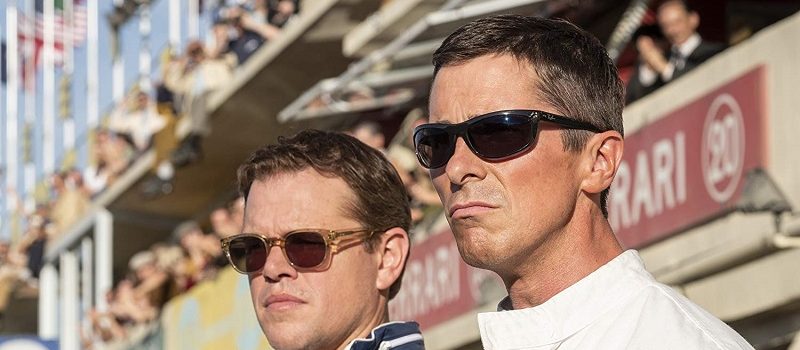After witnessing Matt Damon and Christian Bale in Ford v. Ferrari, it can firmly be stated that they have set the bar quite high for film friendship. To say they dove into their roles in this thrilling true tale is a gross understatement. Then again, when has either not done that!
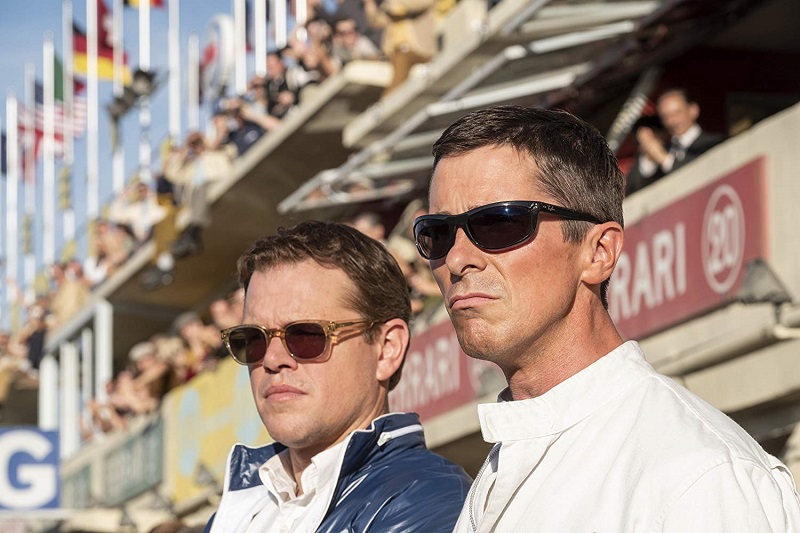
Their first collaboration tells the real life story of what happened when Ford Motor Company decided to throw their American made hat in the ring at one of the most revered and challenging sporting events in the world—the 24 Hours of Le Mans. The film brilliantly lays out the reasons for this in a matter of moments as Lee Iacocca (Jon Bernthal) is giving a presentation to Henry Ford II (Tracy Letts) and the other “suits” at the motor company that bears the name of the original American auto trailblazer.
See, America won the war. Our heroes came home and made babies at a record pace. Those (who would eventually be called Boomers) children were now about 17, and they had more money in their pockets than any other generation at that age. Ford needed to get into, appeal to and get a full-on generational group hug from them in order to thrive in the future. How on earth can that be achieved? Iacocca said, “racing.” Specifically, that French race that a certain Italian (Enzo Ferrari) has dominated for the last several years.
It’s 1966 and Damon’s Carroll Shelby, the only American to win at Le Mans, is now a race care developer and manufacturer. Bale’s Ken Miles is established as a driver with a true gift, albeit one that has failed to launch him into being part of any kind of industry-wide discussion. Therefore, the father of a little boy (who thinks the world of his pop), Peter (Noah Jupe, soon to steal our hearts in Honey Boy), must work at his garage and hope that as he ages, the opportunities do not dry up. Heck, even the IRS is chomping at his heels. His wife Mollie (Outlander’s Caitriona Balfe) is beyond supportive, but … she keenly knows the reality of the family’s fiscal present and future prospects.
As is the case in most extraordinary true stories, fate has a funny way of aligning all the stars that need to be where they are at that moment in time. As Iacocca was winning over Ford with the idea, Shelby and Miles share an itch that can only be scratched at speeds nearing 200 miles-per-hour. Bernthal’s character shows up and recruits Shelby to design a car for the auto giant that will beat Ferrari. Money is no object, but time is … the brass in Detroit want to have a Ford in Le Mans within the year. Shelby believes in himself and the fine autoworkers at Ford that this can be done, but—in his mind—must include Miles as the car’s driver.
All these various elements are tossed into what adds up to a stunningly endearing and triumphant stew and the result could not be more thrilling, exciting, heart-poundingly raw and above all else—virtually waves that American flag without hitting the audience over the head with it.
It all starts and finishes with director James Mangold. The helmer behind some recent stunners, such as Logan and the Oscar winning Walk the Line further gets us down his rabbit hole of filmmaking brilliance with another film that is surely going to hear its name called repeatedly when those Academy Award nominations are handed out in January. Mangold took the sensational script by Jez Butterworth, John-Henry Butterworth and Jason Keller and brought it to life in the most heart-revving manner one could imagine. Proof of their brilliant effort is that the film clocks in at two-and-a-half hours and when those credits rolled, the audience could have easily spent another half-hour with these 60s-set players.
Mangold not only delivers an emotive-driven tale that tugs at our heartstrings for a myriad of reasons, but one would be hard pressed to find a film that captures the speed, danger and dynamics of the institution that is the auto race. He puts the viewer in the car, and beside it, on top of it and behind it. Rarely has the cinemas been inhabited by an auto-driven vehicle that literally runs it in to the red in the best of ways. Ron Howard’s Rush is the most recent example of a film that pushed the envelope of auto racing and how it’s filmed, presented and captured. Mangold sets up the big race, Le Mans (that is essentially the final 20-25 minutes of the movie), the stakes and how each of the players’ lives will be altered by the results of Miles’ 24-hour race into history.
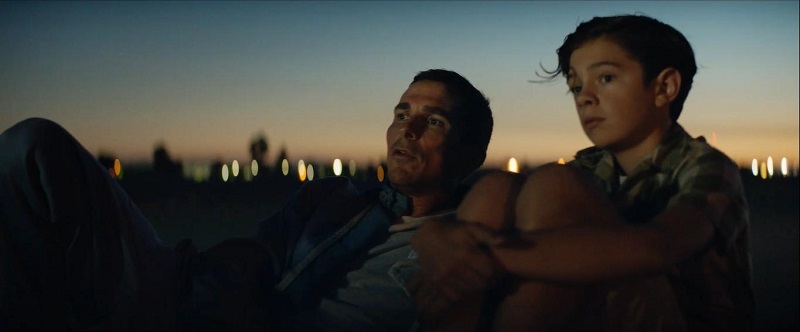
As is always the case, Bale is bodaciously brilliant. One can literally feel his passion for racing and how it concurrently continues to break his heart. Miles is not of the faint of heart, then again, that is exactly the personality type that is required of a driver in this sport. He also does not have the best censorship abilities for his mouth and his pointed opinions. Continuously, his steadfast thoughts on matters big and small will compel many to label him, “hard to work with” and “not a team player.” Much of the dramatic push and pull that goes on in Ford v. Ferrari center on Detroit’s collective opinions on whether they can even win anything with Miles behind the wheel. For Shelby, he keenly is aware that Ford’s greatest shot at victory, at the iconic race that has previously eluded all American car manufacturers, is putting the firecracker that is Miles behind the wheel. Bale’s characterization never makes Miles unlikable or off-putting. It, instead, takes us inside the mind of a genius who is the best at what he does and knows it. Not to the point of arrogance, it’s just a fact and he carries himself as such.
Not that Damon has a “type of character” that he plays, but he goes deep here as Shelby, who before Ford’s entry into the Le Mans landscape, was a national treasure. As the actor plays him, his career change was thrust upon him and not the other way around. He carries around a lot of anger and resentment about that fact. As Damon captures with his triumphant turn, it is easy to see how he channels that disdain to other arenas, such as going all in on the previously insane idea that an American auto manufacturer could emerge victorious from that couldn’t be more European race. Damon plays both sides so well, it’s uncanny. He finds means with which to connect with the suits of Detroit and can turn on a dime and get his hands dirty, covered with grease, to connect with his driver and their crew. Damon is the gift that just keeps giving. The actor, black cowboy hat in tow, has a giddy-up about him that is inspiring. So many of us have been dealt a hand that was not what we envisioned when sitting in bed as a teenager and imagining what the ideal future would embody. The Boston born thespian, by the close of Ford v. Ferrari, had us believing that there is nothing he can’t accomplish in the realm of acting.
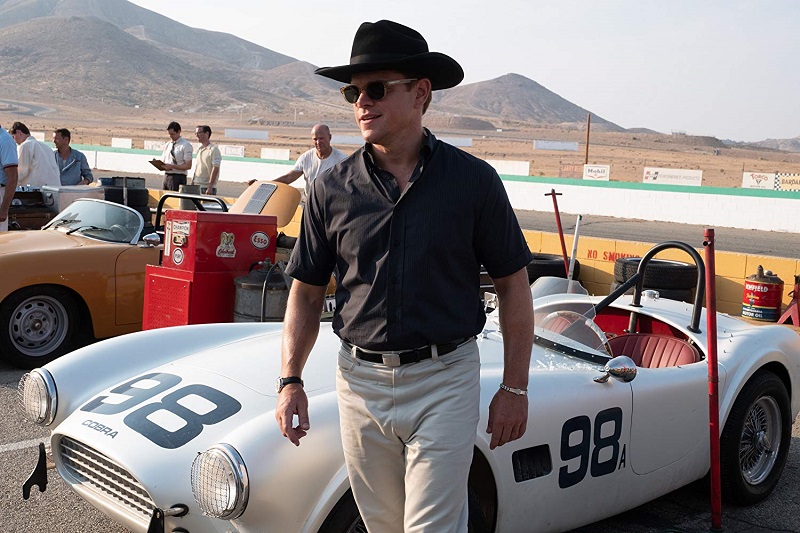
Then again, that feeling permeates every frame of Mangold’s glorious gift to cinema goers.
It is a constant reminder, like a The Right Stuff or the documentary from this year that celebrated the 50th anniversary of our landing on the moon, Apollo 11, that there is nothing Americans cannot achieve when they lock arms, get to work and get behind a common goal. Here is Ford, the quintessential American corporation, getting the idea that they want to build a car, race it at Le Mans, and emerge victorious in a race that has been won by the epitome of European racing, Ferrari. To this day, the Italian car manufacturer embodies speed. Just like we did as a nation when President John F. Kennedy told the country that by the end of the decade, the United States would put a man on the moon. Subsequently, a legion of American heroes got to work, put in the long hours and fortitude and yes, by the end of the 60s, Neil Armstrong took a walk that the entire planet was marveled by and still triumphs today.
The same thing could be said for Ford and how the company decided one day to enter the world of racing, specifically European competitions. With great minds like Shelby, Miles and their entire team that spanned from Detroit to Los Angeles (where Shelby was headquartered and Miles lived), good old fashioned American know-how and an unmatched work ethic would at least put America in the conversation … the rest would lie on the shoulders and talent of the driver.
Exiting Ford v. Ferrari, the overwhelming feeling was one of great American pride. There really is nothing we cannot accomplish in the USA if we put aside our differences, embrace what are our common threads and get to work. It’s something that has happened over and over across our great nation’s history. At a time in our country’s history where it could be argued we are more divided than at any time since the Civil War, a movie like Mangold’s is just the tonic for what ails us. It reminds that the American spirit, know-how and grit is unmatched in the world. We could certainly use a whole lot of that these days. It’s easy to forget what a united country looks like. Remember after the so-called Miracle on Ice, whose flags waved that had been dormant for much of the 70s? Recall how the great people that inhabit the United States were faced with an economic crisis that had us on the ropes and on the precipice of another Great Depression in 2008? We got to work, made those sacrifices and the economy rebounded.
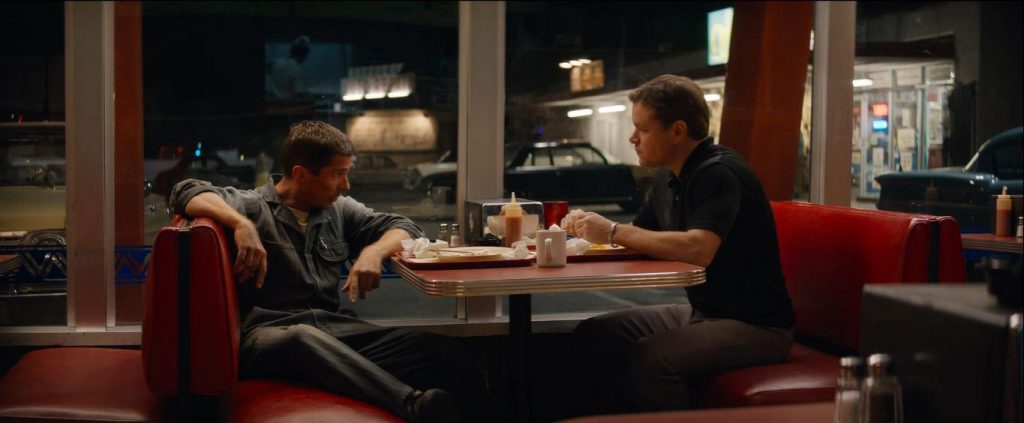
Ford v. Ferrari is a cinematic lesson in good old fashioned American mettle that, when done right, is pure movie magic. With Mangold, Bale and Damon, the otherworldly talented trio reminds us once again what makes this nation so truly special. The timing of Mangold’s film could not be more in tune to the times. It’s pitch perfect.
Grade: A

